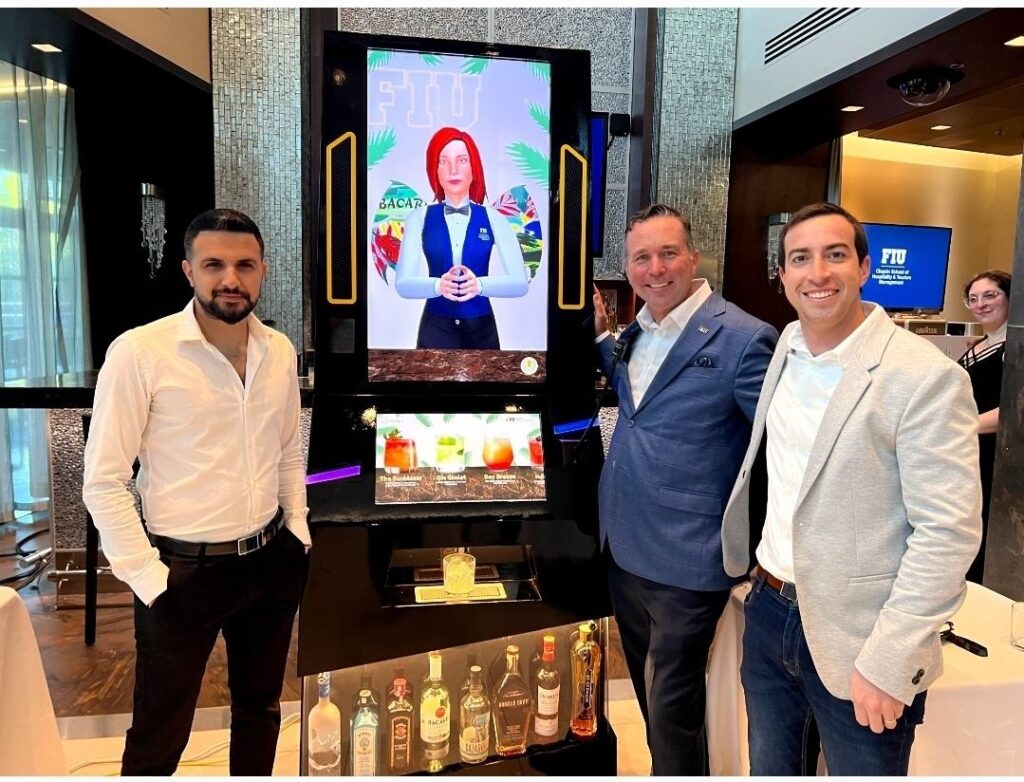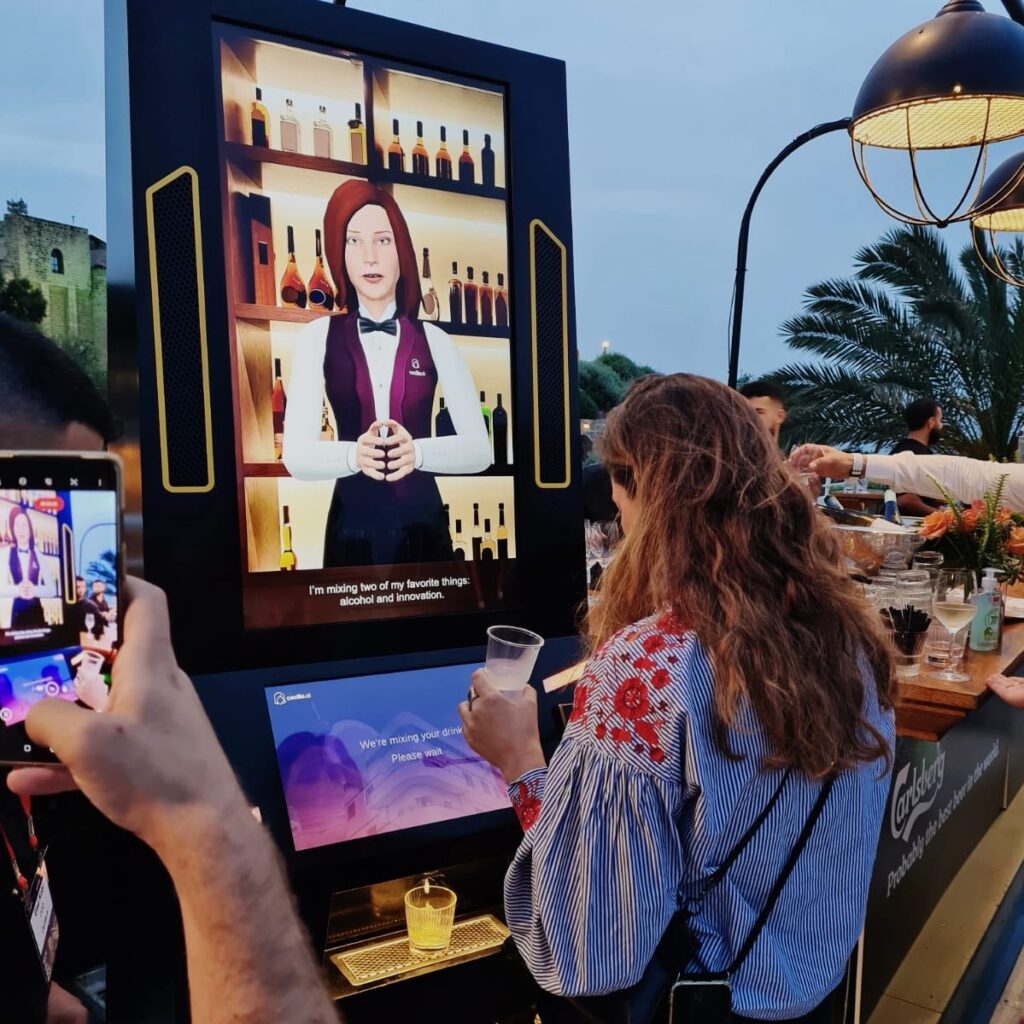Cecilia shakes up cocktails like a pro. Ask her what’s on the menu, and she’ll run down the list with ease, or throw out a witty one-liner. Then she’ll quickly whip up your drink of choice — without lifting a finger.
Cecilia is not your typical bartender. She’s a robot, powered by artificial intelligence and voice recognition. Just tell her what you want, or let her recommend something fruity, sweet, smoky, or classic from her menu.
The Israeli-developed interactive robot called Cecilia.ai is seven feet tall, with easy plug-and-play installation that means she can readily be moved between hotels, universities, cruise ships, VIP lounges, and even company offices. She can serve 120 cocktails an hour 24/7 without taking breaks.
The original robot was developed three years ago as a fun addition for events and conferences, Elad Kobi and Nir Cohen Paraira tell NoCamels. They are CEO and Director of Marketing of Cecilia.ai and COO and Marketing Director, respectively, of GKI Group, the company behind Israel’s first single malt whiskey distillery.
“We had really good feedback and we understood that we have something here. People really like it and they also asked ‘How can we get it to our office, because it’s very cool,” says Cohen Paraira. “So when we got that feedback, we understood that we have something much bigger than events and conferences on our hands.”
Cecilia speaks 40 languages and can take orders via voice or touch screen menu. She uses cameras and voice recognition to interact with customers and a robotic arm to pour the drinks. She has an ID scanner to check proof of age, and accepts cashless payments.

Cecilia uses natural language processes (NLP) voice recognition to understand customers. Most of that NLP technology is being developed in the Israel office. The animated Cecilia avatar is based on the Unity cross-platform game engine, developed by Unity Technologies and used by a number of game developers to create and power their creations.
“Every time she speaks with someone, she’s getting smarter because if she doesn’t understand something, she will automatically put it in a file of misunderstanding, and eventually, she will learn how to generate answers more quickly,” says Cohen Paraira.

The team officially launched Cecilia.ai in the US last November during a business trip to Miami and Las Vegas.
In February, Cecilia.ai agreed to a partnership with the Bacardi Center of Excellence at Florida International University (FIU) in Miami, Florida, to “blend its robotic bartender as a part of the curriculum for enriching the students in the fields of hospitality innovation, alternate solutions, and combining mixology with technology.”
Kobi said: “It’s our first strategic customer in the United States. We’re extremely excited about the upcoming debut. It’s a significant foothold for Cecilia.ai in the American market, and we’re thrilled about what’s expected for us later this year.”
Sign up for our free weekly newsletter
SubscribeDuring the program, student mixologists will learn how to build a cocktail menu, invent recipes and mixes, and implement them in Cecilia.ai until it makes the perfect cocktail.
Other customers using Cecilia include Microsoft headquarters in Redmond, Washington, where she talks about Microsoft products, the office itself, and Microsoft’s vision of technology. “And of course, she makes drinks for the customers,” adds Paraira.
During the COVID-19 pandemic, developers were working on the next-generation Cecilia robot “for businesses in the long run” including bars and hotels, helping them sell more drinks and bringing new, innovative experiences to their guests.
“One of the hardest things is to make your bartender learn the messaging that you want your customers to receive. So with Cecilia, you can really make sure that the messaging that you want your customers to know, they will know it from experience,” says Cohen Paraira.
What Cecilia says, does, and offers for drinks can be customized to the needs of the client. And she provides valuable analytics that help clients understand what their customers are looking for.
“I can control the messaging, the branding, the story about the company and also the analytics with Cecilia,” Kobi explains. “So you really get valuable information about the business, because if it’s a bartender that works all day, for example, he won’t remember all the features. She’ll remember and she’ll do the filtering.
“One time, there was a business using Cecilia, and she told them: ‘We noticed on the first day that we had 39 customers who asked for tequila.’ So we told them, maybe you should bring a tequila-based cocktail to the business. And it ended up as the bar’s second-best cocktail.”
Cecilia is not going to replace human bartenders, the company says. She’s designed to supplement them.
“In the future, you’re going to see a lot of robotics and interactive machines that are going to interact with different customers in different places,” says Kobi.
“The idea is that it can really help businesses with other bartenders to bring a wider menu. Cecilia can also generate new revenue streams anywhere you can put a bar – like a lounge, where you won’t necessarily want to put a new worker, or in a stadium in addition to other bartenders.”
Related posts

Editors’ & Readers’ Choice: 10 Favorite NoCamels Articles

Forward Facing: What Does The Future Hold For Israeli High-Tech?

Impact Innovation: Israeli Startups That Could Shape Our Future




Facebook comments